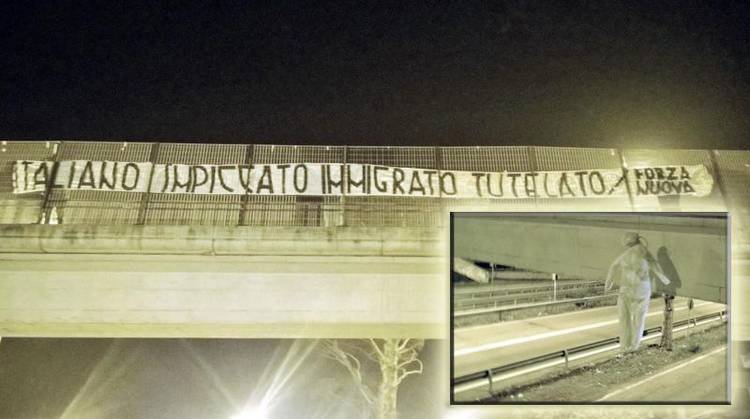


ROME – It was night in Rome’s down-market suburb of Infernetto, and to show that immigrants are unwelcome there, rightwingers fashioned gruesome mannequins clothed all in white, and hanged them from bridge rafters over a main road. In case anyone missed the point, a banner proclaimed, “Italian hanged, migrant protected: Italians [come] first.” The signature scrawled on the banner, familiar to Romans, was Forza Nuova, an extreme right-wing political organization that harks back to early postwar nostalgia for Fascism.
Behind the gesture, which immediately ignited an avalanche of protests against racism, was the Rome city fathers’ decision to transfer thirty immigrant youths to a shelter for refugees at Infernetto, a small town near modern Ostia. The previous year, when Congo-born Dr. Cecile Kyenge – at the time Italy’s Minister for Integration – was to visit the same area, red-stained (as if bloody) dummies were similarly draped about as a protest measure.
Inside the Infernetto refugee center itself, police had to intervene when a fistfight broke out between some of the minors from Eritrea and others from North Africa; the five injured included one of the shelter’s social workers. Local residents complain that within a square mile, some 1,600 immigrants plus another thousand Roma (Gypsies) are housed. As the daily Corriere della Sera reported, this is an area “already suffering from illegality, social degradation and unemployment,” where prostitution, make-shift huts and night-time burning of toxic waste aggravate the already difficult situation. The immigrants are blamed, and, as a result, on Nov. 22, an anti-immigrant rally was held in the town, with the enthusiastic backing of a member of the European Parliament, Mario Borghezio of the notoriously anti-immigrant Northern League. The good news was that no more than 150 turned out.
Still, what may seem isolated incidents are not. Anti-immigrant feeling is beginning to play a part in the broader political picture, as was shown in regional elections held this past weekend in Emilia-Romagna in the North and in Calabria in the South. Showing notable disaffection with traditional politics, the turnout in the once highly political, left-leaning Emilia-Romagna was under 38%. By comparison, only four years ago the turnout for regional elections in the region’s main cities like Bologna, Modena, Reggio Emilia and Ferrara was around 70%.
If not quite so dramatic as in Emilia-Romagna, record abstentions also marked the Calabrian vote, along with a stunning decline in votes for Beppe Grillo’s Movimento Cinque Stelle. Grillo’s party claimed less than 5%, or one voter out of twenty. The difference since last May’s European parliamentary elections is literally stunning: only six months ago the M5S had copped over 20% of the vote in Calabria.
Although Stefano Bonaccini, the candidate representing Premier Matteo Renzi’s center-left coalition, prevailed for regional presidency in Emilia-Romagna, the Northern League’s candidate Alan Fabbri won almost 30%. In what had been heartland leftist territory it came as a shock to the left when, throughout the region, the League claimed almost 20% of the vote; by comparison it had won only 14% in regional elections in 2010. “For the League, this is an historical victory,” crowed League national leader Matteo Salvini on RAI Radio 3.
The losers there were Silvio Berlusconi’s Forza Italia with just over 8% and the rightist Fratelli d’Italia-Alleanza Nazionale, with under 2%. Speaking on behalf of the League, Salvini said, “If I were Renzi, I’d be worried because he doesn’t seem to keep his promises” (le promesse iniziano ad avere le gambe molto corte).
Renzi seemed undisturbed, dismissing the low turnout with praise for the new president of Emilia-Romagna, the candidate of Renzi’s Partito Democratico. “I have all the respect in the world for the chatterers,” said Renzi, evidently referring to Salvini. “But in the meantime we have taken back from the center-right four regions [of 20]. Our goal remains to change Italy.”
Change remains the watchword, but who is to bring it about? The background chatter this month is also a counterpoint wave of industrial strikes. In the acid words of Maurizio Landini, who is general secretary of the metals workers of Fiom and the leftist trade union CGIL: “The abstentions in the regional vote show that people don’t turn out to vote. But our workers’ strikes are having a success without precedent. People understand that there is an autonomous and independent trade union that wants to change things.”
Source URL: http://440468.6bgr9ubv.asia/magazine/events/reports/article/low-turnout-high-league-vote-mark-regional-elections
Links
[1] http://440468.6bgr9ubv.asia/files/italiano1416851271jpg